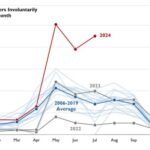Energy News Beat
[[{“value”:”
Amid a surge in utility shutoffs, and in the face of a groundbreaking study finding racial disparities in those outcomes, Minnesota’s largest utility is taking a closer look at the issue.
In a November agreement with consumer groups and the state’s Public Utilities Commission, Xcel Energy has outlined a series of steps to provide more information to customers and make it easier for them to restore service.
Xcel also agreed to hire an outside consultant to conduct a one-year study of disparity issues related to disconnections and outages and, separately, do its own analysis of outages. The move came in response to a University of Minnesota study released earlier this year that found that people of color were more likely than White households to have their service disconnected for falling behind on bills, even when controlling for income and home ownership status.
The agreement falls short of a demand from the Minnesota Attorney General’s Office for Xcel to institute a temporary moratorium on shutoffs until racial disparities are addressed, based on a recommendation from Fresh Energy and a coalition formed by Cooperative Energy Futures, Environmental Law & Policy Center, Sierra Club, and Vote Solar.
Erica McConnell, staff attorney for the Environmental Law & Policy Center, represented the clean energy organizations advocating for grid equity. She supported the agreement but believes it will do little to help reduce disparities in shutoffs.
“These are very important improvements that don’t really address — and the commission didn’t discuss — the disparate impacts and the racial disparity (of disconnections) and how to address that specifically,” she said.
A temporary moratorium on disconnections would have allowed for time to study disparities and find ways to address them.
“The commission didn’t talk about that,” McConnell said. “They didn’t address it at all, so that was disappointing. I understand it’s uncomfortable and it’s a tough issue, but it’s disappointing they shied away taking it head on.”
Beyond the challenge of disparities, Xcel’s number of service disconnections has skyrocketed. More than 45,000 Xcel customers saw their power shut off this year, a number that has grown significantly over the last two decades.
Xcel agreed to many proposals from the Citizens Utility Board of Minnesota, the Energy CENTS Coalition, clean energy organizations and the Public Utilities Commission to create more consumer protection against shutoffs.
Xcel Energy’s involuntary disconnection notices began rising significantly in 2023 before skyrocketing in 2024, when shutoffs doubled the prior year’s total for May through July. Despite Minnesota’s cold weather protection rules that limit disconnections during the winter through April 30, shutoffs even grew during the winter months.

Clean energy and consumer organizations point to Xcel’s ability to remotely disconnect customers who have smart meters as a major reason for the shutoffs, along with inflation, escalating rate increases and challenging repayment requirements. Xcel had demanded customers pay 50% of what they owe to reconnect, which may have violated Minnesota law, according to the Citizens Utility Board.
Xcel’s pact with the Citizens Utility Board and Energy CENTS “is going to make payment agreements more affordable and hopefully help households that are behind on their bills avoid getting shut off and get caught back up,” said Annie Levenson-Falk, executive director of the Citizens Utility Board of Minnesota.
The utility board and Energy CENTS Coalition forged the agreement with Xcel under the purview of the Public Utilities Commission, which will issue a final order later. The agreement requires the following:
- Customers will pay 10% of what they owe to have the power turned back on, instead of 50%.
- The amount due will have to be at least $180 before Xcel can send a disconnect notice.
- Xcel cannot shut off power until a customer reaches a $300 past due balance. Xcel’s data from this year showed disconnected customers were $441 in arrears on average in October and much higher in other months.
- The utility must wait at least 10 days after a shutoff notice has been sent to disconnect, up from five days.
- Xcel must post clear disconnection and payment policies on its website, along with information about customers’ right to develop an affordable repayment plan. Any changes Xcel makes to shutoff policies and repayments have to be reported to the commission, and it must collect data on repayments and customer agreements.
- A variance allowing remote disconnections without field visits from Xcel remains, but the utility must contact customers via voicemail and use at least one other form of electronic communication.
Xcel spokesperson Kevin Coss said the utility believes “this agreement is a great step toward reducing disconnections for some of our customers who continue to struggle economically.”
George Shardlow, Energy CENTS executive director, said he thought a clearer explanation of the disconnection process on Xcel’s website brings a transparency that had been lacking.
“I don’t think the average person even knows that they have a right to negotiate when they’re struggling to pay their bills,” he said. “It’s all sort of opaque. We’re excited to see better documentation of people’s rights on Xcel’s website.”
Minnesota law says utility customers are “entitled” to a payment plan they can afford, Shardlow said. Customers who cannot afford the 10% down payment can still negotiate for a settlement that fits their budget, he added.
Shutoffs have been growing. This year Xcel sent disconnection notices to 51,000 customers in January and 71,000 in July. But not all notices result in shutoffs. The highest month for disconnections, May, saw more than 10,000 shutoffs. By August, slightly more than 8,400 customers had been disconnected.
Coss said Xcel works with customers to avoid disconnection by starting a nine-week process of contacting them through multiple channels to “point them to available options for energy assistance — both through the federal Low Income Home Energy Assistance Program and our own affordability programs — and offer flexible payment plans tailored to their circumstances.”
Minnesota also has cold weather protections that greatly reduce utilities’ ability to disconnect customers in winter months. But people who fail to pay their bills in winter see their balances grow, leading to higher disconnections in summer when they fail to catch up.
Xcel agreed to monitor progress and collect more data on racial disparities involving customers involuntarily shut off. The utility has already hired a third party evaluator, as the agreement requires, to study its shutoff policies and hold stakeholder engagement meetings during the year-long process.
Coss said disparities result in inequities throughout society and Xcel has been doing its part to address them. The utility has worked with the study’s authors and advocacy groups to identify actions to reduce disparities, he said.
Earlier this year, the commission also approved a proposal by Xcel for a pilot program that will provide bill credits to select census tracts with high levels of disconnections. Coss said Xcel will provide $500 bill credits to customers in low-income census areas who have a greater than $2,000 past-due balance, using money available from a quality of service program.
Minnesota Public Utilities Commissioner Joe Sullivan said he believed the agreement negotiated among the nonprofits and utility would reduce the financial strain on households facing disconnections and assist Xcel in recovering debt.
“I thought that in that docket people came together and were constructive,” he said. “I feel like I’m hopeful that the order will make some progress.”
PUC Chair Katie Sieben said the commission is “always looking at affordability, and especially as it pertains to low-income customers, I think we have a great track record on working with stakeholders and with utilities to provide robust low-income assistance to customers.”
She mentioned the commission’s role in approving an Xcel pilot to decrease payments for low-income, low-usage customers and a September decision that used a penalty for the utility’s service quality underperformance to provide bill credits to around 1,000 customers with the oldest outstanding balances in low-income census tracts.
The agreement does not solve the problem of low-income customers struggling to pay utility bills. Shardlow said Energy CENTS and the Citizens Utility Board lobbied the state legislature to allow households to apply for energy assistance funding the entire year instead of the current policy of having a deadline of May 31. Only 20% of eligible Minnesota households participate in the program, he said.
Levenson-Falk wants Xcel to consider eliminating the 1.5% late fee it charges customers on their balance, or consider donating the money to affordability programs.
The Citizens Utility Board also wants Xcel to develop a plan to reconnect customers quickly on days of high heat or poor air quality. Coss said Xcel will evaluate reconnecting customers disconnected during days of air quality alerts.
Levenson-Falk said the agreement at least makes progress. “I think we resolved everything that we had discussed with Xcel but that’s not to say that we think this is going to solve the problem, because, of course, there are still going to be continuing shutoffs, and those are still very concerning,” she said. “There’s still more work to do.”
This story was updated to include a statement from Minnesota Public Utilities Commission Chair Katie Sieben.
Fresh Energy staff, board members and funders do not have access to or oversight of the Energy News Network’s editorial process. More about our relationship with Fresh Energy can be found in our code of ethics.
Related
“}]]
The post As utility shutoffs soar in Minnesota, Xcel Energy agrees to consumer protections and racial disparities study appeared first on Energy News Beat.









